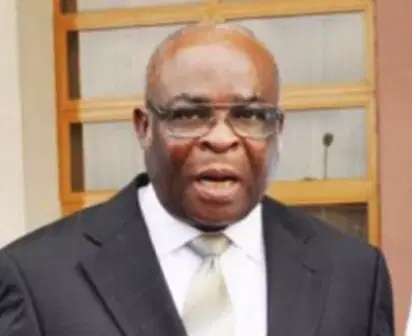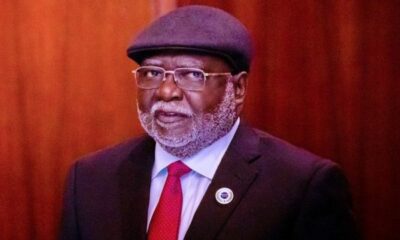
News
Ex-CJN Onnoghen’s Appeal Against Removal Set for Hearing

(iexclusivenews) – Former Chief Justice of Nigeria (CJN) Walter Onnoghen’s appeal challenging his 2019 removal from office is scheduled for hearing at the Court of Appeal on Tuesday.
This landmark case has drawn significant attention from legal circles and the general public, as it questions the legitimacy of the Code of Conduct Tribunal’s (CCT) decision that led to Onnoghen’s controversial ouster.

Onnoghen, through his lead counsel Adegboyega Awomolo, SAN, is seeking to overturn the CCT judgment delivered on April 18, 2019.
The appeal, marked CA/ABJ/375 & 376 & 377/2019, primarily contests the tribunal’s jurisdiction, alleges bias, and claims a lack of fair hearing in the proceedings that led to his conviction.
The case stems from the CCT’s 2019 verdict, which found Onnoghen guilty on all six counts of breaching the Code of Conduct for Public Officers.

This conviction resulted in his immediate removal as CJN and stripped him of other key positions, including chairmanship of the National Judicial Council (NJC) and the Federal Judicial Service Commission.
RELATED: CJN Ariwoola Warns Judges Against Mob Rule In Nigeria
Grounds for Appeal and Sought Reliefs
Onnoghen’s appeal rests on 16 grounds, challenging various aspects of the CCT’s decision.
A key argument in his appeal is that as a judicial officer at the time charges were filed against him on January 11, 2019, he should not have been subject to the CCT’s jurisdiction.
Citing the case of Nganiiwa v. FRN (2018), Onnoghen argues that only the National Judicial Council has the power to discipline judicial officers for misconduct.
The former CJN is also contesting the CCT Chairman Danladi Umar’s refusal to recuse himself from the proceedings, despite allegations of bias.
Onnoghen claims that open remarks made by Umar and the manner in which the proceedings were conducted indicated a predisposition against him.
In his appeal, Onnoghen seeks several reliefs, including an order setting aside his conviction, quashing the order for forfeiture of his assets, and a complete discharge and acquittal from all charges leveled against him.
Implications for Nigeria’s Judiciary and Rule of Law
This high-profile case has far-reaching implications for Nigeria’s judiciary and the broader concept of the rule of law.
It raises critical questions about the separation of powers, the independence of the judiciary, and the proper channels for disciplining top judicial officers.
The outcome of this appeal could potentially set a precedent for how similar cases are handled in the future, particularly regarding the jurisdiction of the CCT over serving judicial officers.
It also highlights the ongoing debate about the need for transparency and accountability in Nigeria’s judicial system while maintaining the integrity and independence of the judiciary.
As the Court of Appeal prepares to hear this case, legal experts and citizens alike are keenly watching, recognizing its potential to shape the future landscape of Nigeria’s judicial and constitutional framework.
The decision could either reinforce or challenge existing interpretations of the law regarding the disciplining of judicial officers and the powers of various bodies within Nigeria’s legal system.




























